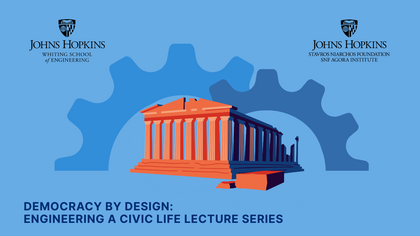Democracy by Design Series | Engineering a Stronger Democracy

Description
The first installment of the Democracy by Design: Engineering a Civic Life Lecture Series features Congressman John Sarbanes. His lecture, "Engineering a Stronger Democracy," will explore how we reform the design features of America's voting and governing machinery in order to restore public confidence in our elections and ensure that everyday citizens—not special interests—drive legislative policy in Washington.
About Congressman Sarbanes
In January 2025, Rep. Sarbanes retired from the U.S. House of Representatives after 18 years representing Maryland's 3rd District. As a member of the Energy and Commerce Committee, he focused on health, environment, and energy issues. Sarbanes also led efforts to advance HR1, the Freedom to Vote Act, a historic suite of reforms to protect the right to vote, clean up corruption in Washington and restore trust, transparency, and integrity in government. On the education front, he authored legislation establishing the Public Service Loan Forgiveness program, which to date has brought student debt relief to over a million individuals pursuing careers as teachers, nurses, social workers, first responders, service members, and other careers in the public and nonprofit sectors.
Prior to entering Congress, Sarbanes spent nearly two decades as a health care attorney at the Venable law firm and seven years leading school reform efforts at the Maryland Department of Education. Sarbanes is a graduate of Princeton University and earned a Fulbright Scholarship to Greece before attending Harvard Law School. He is currently serving as Distinguished Practitioner in Residence at the SNF Agora Institute for Global Democracy at Johns Hopkins University.
About the Series
Civic life is foundational to a healthy democracy, encompassing political participation, community service, and advocacy. Co-hosted by the SNF Agora Institute and the Center for Leadership Education, Democracy by Design: Engineering a Civic Life explores the crucial relationship between engineering and civic engagement, emphasizing how engineering practices can improve democratic processes and, in turn, how democratic ideals inform responsible engineering. Through discussions on improving electoral systems, fostering data-driven decision-making, and making democratic processes more accessible, this series underscores the vital role that engineering plays in shaping civic life in the 21st century.
Who can attend?
- Faculty
- Staff
- Students







